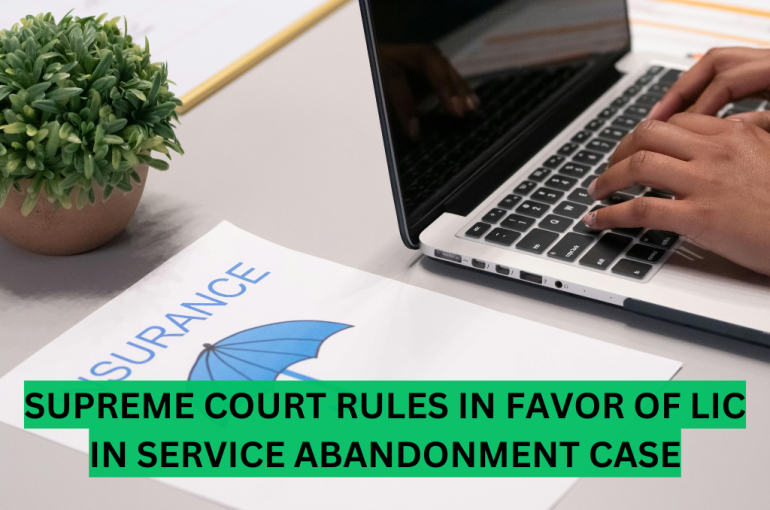SUPREME COURT RULES IN FAVOR OF LIC IN SERVICE ABANDONMENT CASE
This Judgment was delivered by a Bench of the Supreme Court comprising Hon’ble Justice Hrishikesh Roy and Justice S.V.N. Bhatti on November 13, 2024 in the Case of Life Insurance Corporation of India & Ors. v. Om Parkash (Civil Appeal No. 4393 of 2010). It arose from an Appeal against the Judgment of the Himachal Pradesh High Court in (LPA No. 6/2003). The case involves the Appellant, Life Insurance Corporation of India (LIC), and the Respondent, Om Parkash. In this case the Court dealt with whether the termination of Om Parkash by LIC on grounds of abandonment of service, without conducting an inquiry, was valid under Regulation 39(4) (iii) of the LIC Staff Regulation, 1960. It also examined whether the Respondent’s concealment of subsequent employment disqualified him from granting equitable relief.
Facts of the Case
The Respondent, Om Parkash, was an Assistant Administrative Officer at the Life Insurance Corporation of India (LIC).He was absent from duty without informing his employer from 25.09.1995.LIC issued notices to him on 06.10.1995, 06.11.1995, and 19.12.1995, asking him to resume duties or face action under Regulation 39(4)(iii) of the LIC Staff Regulation, 1960. These notices remained unanswered by the Respondent. A chargesheet-cum-show cause notice was also issued on 14.02.1996, which was also ignored by the Respondent.LIC invoked Regulation 39(4) (iii) of the LIC Staff Regulation, 1960, which deals with abandonment of service, and terminated the Respondent’s employment on 25.06.1996. Later, theRespondent secured employment with the Food Corporation of India (FCI) on 14.04.1997 but he did not disclose this fact in his writ petition challenging LIC’s termination order.
The High Court
The Hight court of Himachal Pradesh,through its Single Judgeand Division Bench, held that the terminationwas unsustainable due to the lack of an inquiryand ordered LIC to restore him with all consequential benefits.
Issues
1. Whether the actions of the LIC are justified in invoking Regulation 39(4) (iii) and treating the Respondent’s prolonged absence as abandonment of service?
2. Whether the LIC complied with the principles of natural justice in terminating the Respondent’s employment?
3. Whether the Respondent was entitled to equitable relief after concealing his subsequent employment with FCI?
Appellant’s Contentions
The Appellant’s contended that they issued multiple notices to the Respondent, but he did not respond to any of them and his absence from work for over 90 days without intimation qualified as an abandonment of service under Regulation 39(4)(iii)of the LIC Staff Regulation, 1960. They also held that conducting an inquiry was impossible since the Respondent’s whereabouts were unknown to them.The Appellant’salso argued that the Respondent Securedanother employment with FCI on 14.04.1997, indicating abandonment of LIC’s service and the same was also Concealed by the Respondentin his writ petition, and hence he wasn’t entitled to the relief requested.
Respondent’s Contentions
The Respondent contended that the termination was arbitrary and violated the principles of natural justice. They argued that LIC did not conduct a formal inquiry before terminating him, as mandated under Regulation 39.
Supreme Court
The Apex Court overturned the High Court’s decision and held that that LIC was justified in treating the Respondent’s prolonged unauthorized absence as abandonment of service. The Hon’ble Court stated that LIC took reasonable steps by servingnotices, including sending them to the Respondent’s permanent address and complying with procedural requirements underRegulation 39(4) (iii) read with Explanation 1 of the LIC Staff Regulation. According to the Court, theRespondent’s failure to respond and his employment with FCI strengthened the conclusion that he had abandoned LIC’s service.The Apex Court therefore overturned the relief granted by the High Court, stating that the High Court made an error by not considering the Respondent’s concealment of his employment with the FCI. The Court held that the Respondent was disentitled to equitable relief due to his misconduct and concealment of material facts. The Appeal was allowed, and the High Court’s order was quashed.
Baddam Parichaya Reddy
Associate
The Indian Lawyer & Allied Services





































Leave a Reply